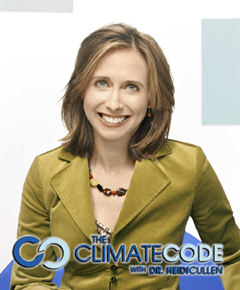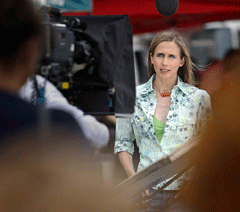Tuning in to Climate
Air Date: Week of September 29, 2006

Climatologist Heidi Cullen is host of "The Climate Code," which premieres on The Weather Channel in October. (Photo:Courtesy of The Weather Channel)
Heidi Cullen, a climate scientist for the Weather Channel, is hosting a new show this fall. But this won’t be your normal local weather forecast. Dr. Cullen tells Living on Earth "The Climate Code" will look at how global warming is affecting people around the world.
Transcript
GELLERMAN: When I heard in 1982 that they were starting the Weather Channel that broadcast 24/7 nothing but weather I remember thinking, “Are they nuts?” Who’d want to watch a station that only dealt with the weather? Well, turns out, a lot of people, including me. There are shows about weather and travel, home and garden, weather and health, global weather, hurricane watch, and now climate change. Starting Sunday, October 1st, the Weather Channel presents the Climate Code with Dr. Heidi Cullen.
[MUSIC]
CULLEN {FROM TAPE]: Hello, I’m Dr. Heidi Cullen, the Weather Channel climate expert. Welcome to our new show the Climate Code, the first weekly program of its kind on television. Here’s our promise: give us 22 minutes and we’ll help you connect the dots about climate change. How it effects you and what it all really means.

Climatologist Heidi Cullen filming “The Climate Code.” (Photo:Courtesy of The Weather Channel)
CULLEN: Hello.
GELLERMAN: A show that deals with only climate change?
CULLEN: Yeah, believe it or not. I’ve been at the Weather Channel for 3 years and I started out as only a cub reporter and I’d get a minute and 30 to talk about global warming if I was lucky, and now we get a whole half-hour.
GELLERMAN: Why?
CULLEN: So many people have been talking about climate change and global warming. I think the weather channel just wanted to stick a scientist up there -me- and talk about the science for folks and then connect the science for people who don’t necessarily feel connected to this huge global warming issue that seems so big and so unfathomable. And we just wanted to explain what’s going on and combat, I think, all of this confusion that’s been circulating out there.
GELLERMAN: There are still skeptics out there. The other day I was flipping through the channels and I came across Fox News and they had a documentary special on debunking climate change.
CULLEN: Yeah, I’m surprised actually that that’s still going on ‘cause, as a scientists I just assume that we’re past this issue of trying to debunk it because the science is really quite simple. Humans emit, we burn fossil fuels, those fossil fuels create carbon dioxide. That carbon dioxide is added into our atmosphere and it causes our atmosphere to warm. It’s warmed about 1.1 degrees Fahrenheit over the past 100 years. And the physics of it are pretty simple. And granted the impact and what it’s going to look like in the future is hard, but I’m really shocked to see that people are still debating the issue. But you know it’s because it’s such a big deal and it hits so many people in the pocket book.
GELLERMAN: Tell me about the format of the program.
CULLEN: Well, I think each show will start with talking about breaking news in science. Weather it was this week’s discussion of the polar ice caps melting more quickly than we thought or putting the summer into perspective. The fact that the summer of 2006 was the hottest summer on record since 1936 which was a Dust Bowl year. Starting with the science, putting that into perspective. And then sort of taking different issues. So the first show, we’re going to talk about how heat is expensive and talk to an economist about the power grid and how electricity consumption is expected to increase substantially over the next 20 to 30 years. And that our grid really isn’t in the best shape to support it.
And then we want to connect that essentially to alternative energy issues. And we ended up going down to Georgia and we did a story on the Vogle power plant, a nuclear power plant being built in a small town in Georgia. And we talk about the fact that nuclear energy has become a hot topic with respect to alternative energy options. And then we end up with an interview with Ted Turner’s daughter, Laura Seidel who is in the process of building this pretty amazing house that has solar panels and geothermal heat. So we sort of start with the science and then we end up with a real person doing something and kind of taking matters into their own hands.
GELLERMAN: How are you going to engage the average viewer? This is a very exciting subject but it can be very scientifically dry.
CULLEN: Yeah, and that’s really going to be the challenge. We want to make people feel like they can talk to us and that they can send in ideas for shows or nominate people. We’ve got this segment of the show called climate changers where folks can either nominate friends or themselves, people who are really doing things about the environment. Whether you’re running your old Mercedes on biodiesel or you name it. So we want to get feedback from viewers and actually, the second episode we are doing is because of a farmer who sent us an email.
And, I don’t know, It’s kind of a neat story. A farmer in Nebraska sent us an email during our coverage of tropical storm Alberto. And he was just like you know I love the weather channel. But I am sick and tired of watching you guys make a big deal out of a nothing storm. Whereas I’m in the middle of the country and you guys always focus on the coast. I’m sitting here in the middle of the country and I am a farmer who’s been dealing with a drought that’s been going on for 7 years. And no one ever talks about what we’re going through. So we were like, hello? Thing is with droughts, they’re not terribly sexy. People love to watch hurricanes but it’s hard to watch a drought, right?
GELLERMAN: Well that’s what I was going to ask you about. How do you deal with climate change without sounding like an alarmist?
CULLEN: Right.
GELLERMAN: Can you do it, more importantly, without alliteration? You know hurricane horror, weather warming, those kind of TV things.
CULLEN: I know and that’s been the hardest part for me since I’ve gone to the TV side of things is I had a really hard time using just adjectives in general. I just always shied away from making these inflammatory statements and, you know, when you watch TV it’s just pretty much common place. So I think for us we want, it’s going to sound cheesy, but we want the science to speak for itself.
GELLERMAN: So tune in to the weather channel, October 1st with Dr. Heidi Cullen. Dr. Cullen, thank you very much.
CULLEN: Thank you.
Links
Living on Earth wants to hear from you!
Living on Earth
62 Calef Highway, Suite 212
Lee, NH 03861
Telephone: 617-287-4121
E-mail: comments@loe.org
Newsletter [Click here]
Donate to Living on Earth!
Living on Earth is an independent media program and relies entirely on contributions from listeners and institutions supporting public service. Please donate now to preserve an independent environmental voice.
NewsletterLiving on Earth offers a weekly delivery of the show's rundown to your mailbox. Sign up for our newsletter today!
 Sailors For The Sea: Be the change you want to sea.
Sailors For The Sea: Be the change you want to sea.
 The Grantham Foundation for the Protection of the Environment: Committed to protecting and improving the health of the global environment.
The Grantham Foundation for the Protection of the Environment: Committed to protecting and improving the health of the global environment.
 Contribute to Living on Earth and receive, as our gift to you, an archival print of one of Mark Seth Lender's extraordinary wildlife photographs. Follow the link to see Mark's current collection of photographs.
Contribute to Living on Earth and receive, as our gift to you, an archival print of one of Mark Seth Lender's extraordinary wildlife photographs. Follow the link to see Mark's current collection of photographs.
 Buy a signed copy of Mark Seth Lender's book Smeagull the Seagull & support Living on Earth
Buy a signed copy of Mark Seth Lender's book Smeagull the Seagull & support Living on Earth

